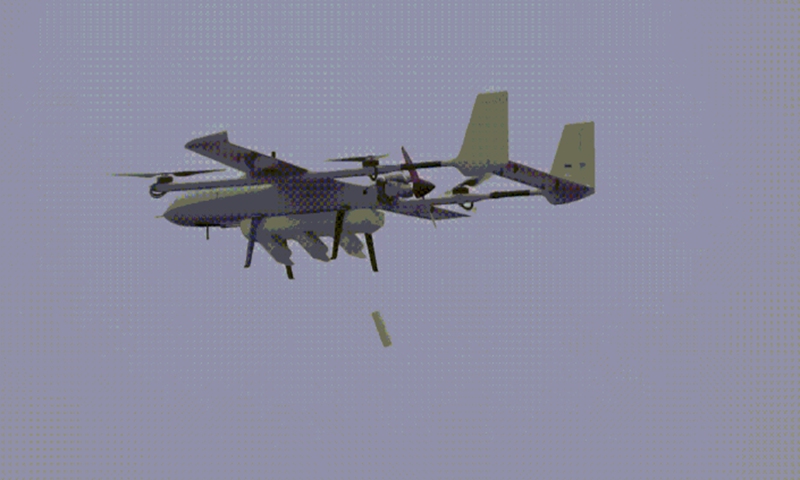A Chinese company recently conducted a test flight for its newly developed airborne swarm carrier, which is an unmanned aerial mother ship that can carry multiple smaller drones and release them in the air for missions like reconnaissance and attack.
This approach could revolutionize future warfare, and when the mother ship, now limited in size, becomes larger, it has the potential of turning into a strategic platform from a tactical one, analysts said on Wednesday.
Developed by Chinese company Zhongtian Feilong, the unmanned swarm carrier system successfully went through a test flight at an airport on March 20, the company announced in a statement released last week.
During the test, a mother ship, which seems to be a fixed wing, vertical takeoff and landing-capable drone, carried nine smaller drones, which were folded under the belly of the mother ship, according to the company statement and a video clip attached to it.
The mother ship opened the aircraft bay after arriving at a designated mission point and dropped the smaller drones in order, while also ensuring the speed, direction, attitude and distance of dropping could match the requirement so the smaller drones could form a swarm, the statement said.
This system is characterized by its long range, strong anti-jamming capability, multiple types of payloads, accurate guidance links and low logistics support requirements, the company said, noting that it is flexible, safe, highly efficient, independent and easy to operate even under complicated environments for different types of combat missions like reconnaissance, early warning, jamming, attack and evaluation.
It was not revealed if the mother ship can retrieve the smaller drones in the air.
Military affairs experts reached by the Global Times on Wednesday said that the system is a new concept in swarm warfare, and it is like an airborne aircraft carrier.
Using drones to launch smaller drones could revolutionize future warfare if the technology becomes mature, because this approach can rapidly increase the number of active aircraft in a mission area, making themselves difficult to defend against and can also expand reconnaissance and early warning area, an expert who asked to remain anonymous said.
Different types of smaller drones can be carried by a mother ship at the same time, as they serve different purposes, just like a maritime aircraft carrier with fighter jets and early warning aircraft. But drones, unmanned and inexpensive, are expendable as long as mission objectives can be accomplished, another expert said.
Other countries are also experimenting with similar technologies, including the US that used an XQ-58A drone to launch an ALTIUS-600, an even smaller unmanned aircraft, on March 26, US media outlet Defense News reported on Monday.
Most of these systems are still experimental in nature and limited in size, analysts said, noting that if the mother ship becomes bigger and carries more drones with stronger capabilities and gains longer endurance, it could in the future play strategic roles from the current tactical roles.
Photo: An unmanned swarm carrier system developed by Chinese company Zhongtian Feilong conducts a test flight in late March. An aerial mother ship drops nine smaller drones in the test flight. Screenshot from the WeChat account of Zhongtian Feilong
Source: Global Times

